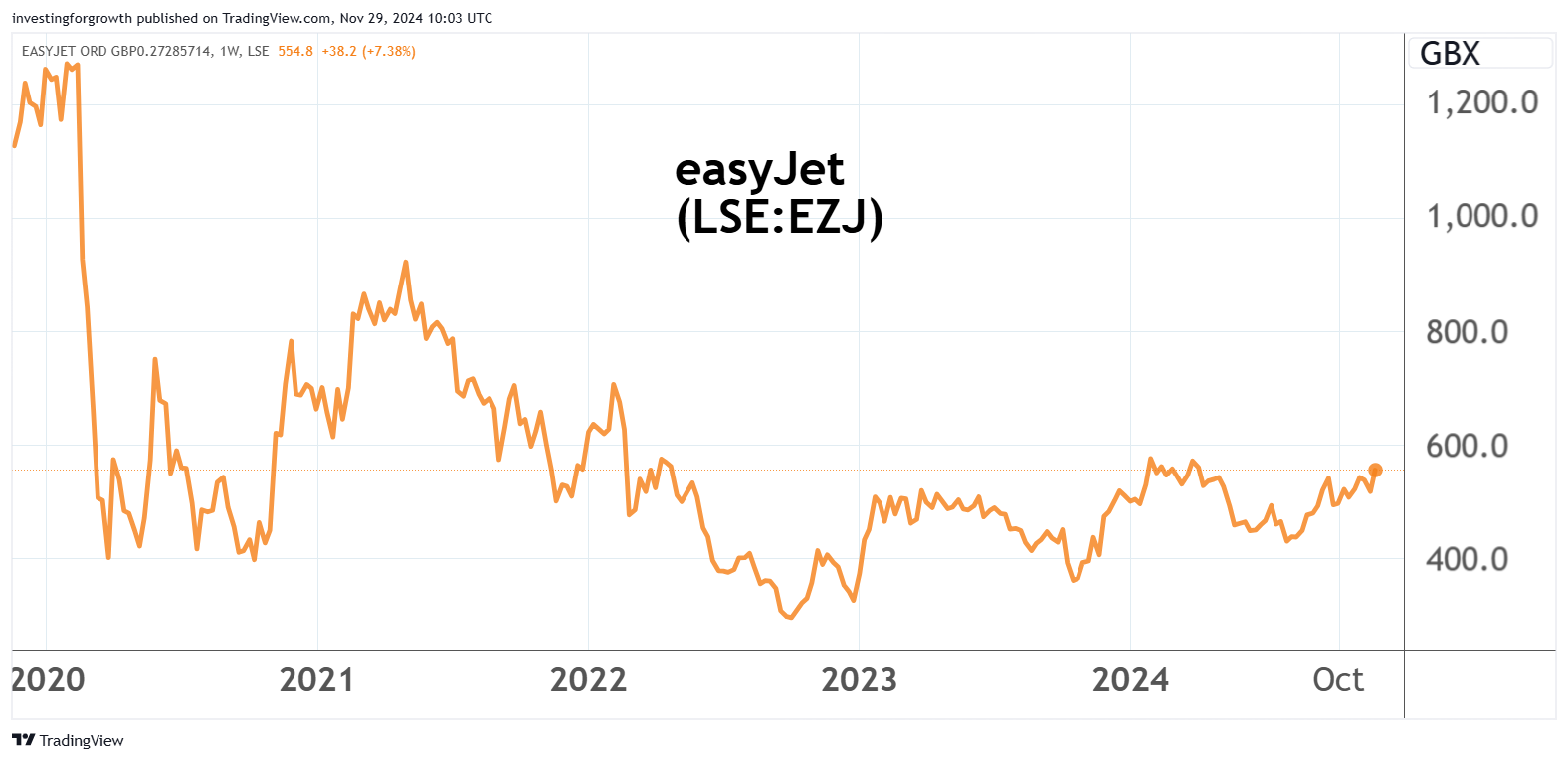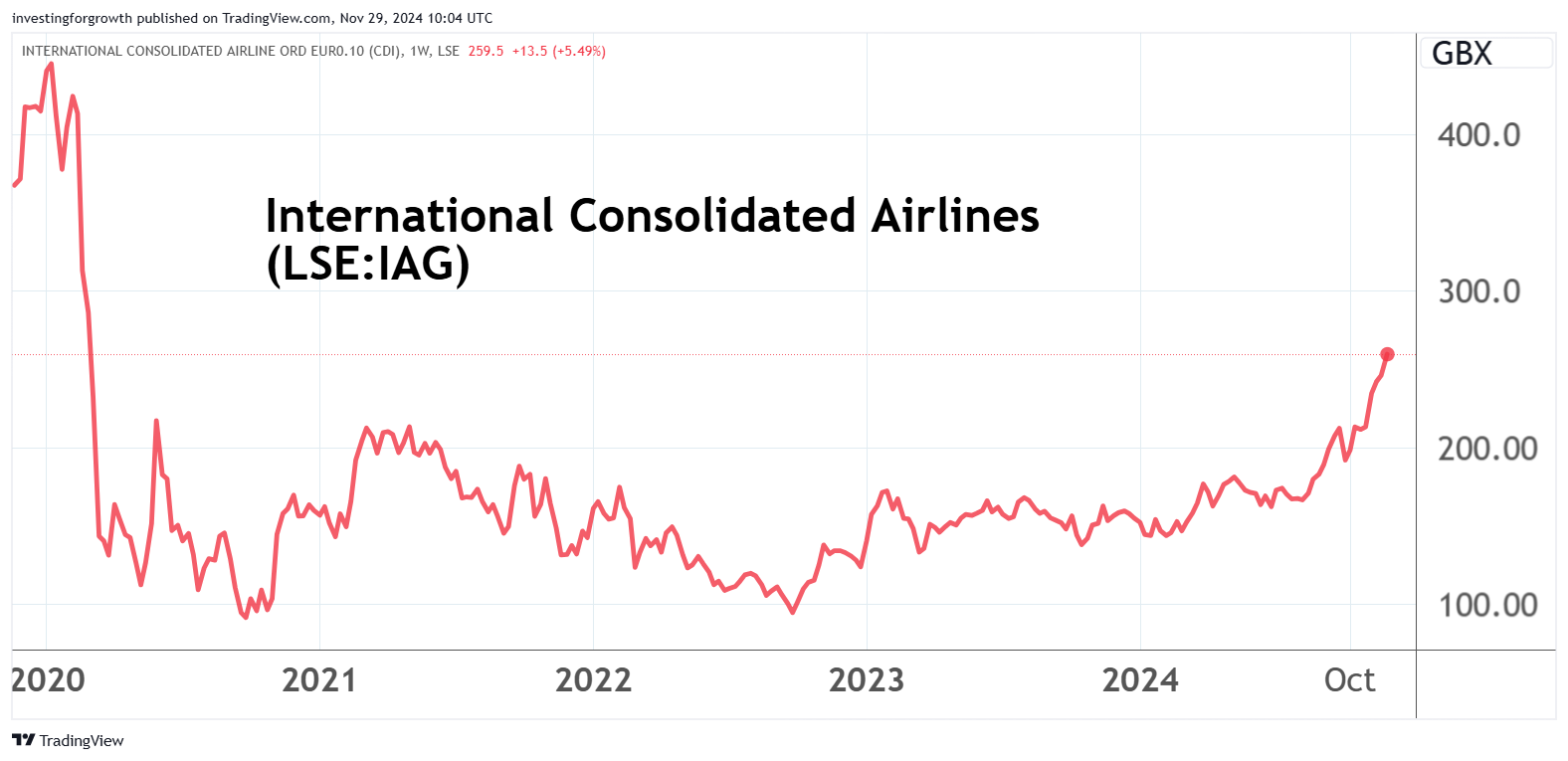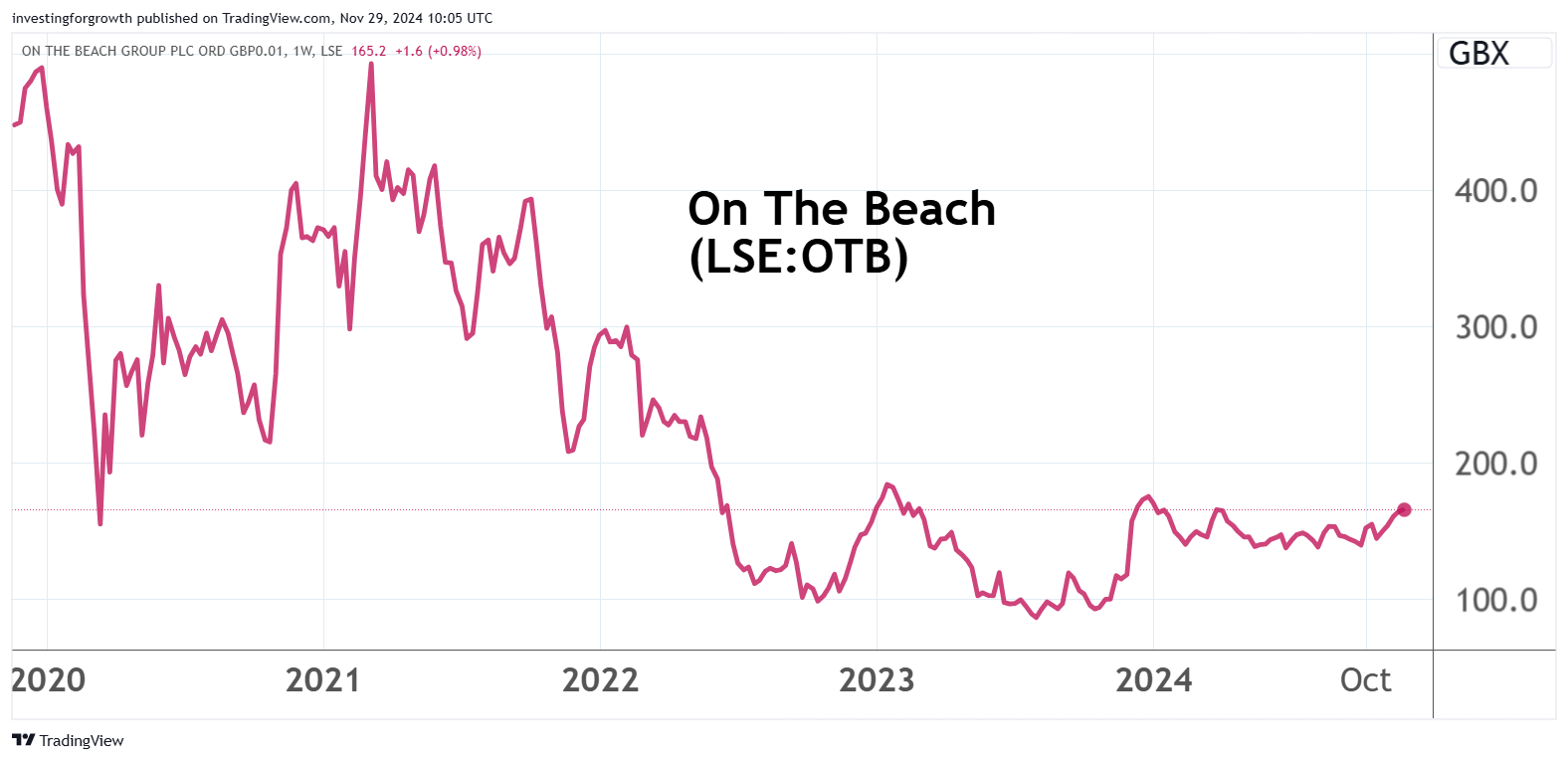Stockwatch: bullish features make these three shares a buy
Hot on the heels of his recent coverage of American bulls taking an interest in the UK, analyst Edmond Jackson finds more reason for optimism, particularly in this recovering sector.
29th November 2024 11:17
by Edmond Jackson from interactive investor

Following my piece on two US investment banks and their optimism about UK shares, it is notable that this week has affirmed two key themes of JP Morgan’s note.
Their strategists expressed confidence that wages will broadly peg inflation and, among discretionary spending, travel is likely a resilient sector. We have yet to see the effect of employers’ higher national insurance contributions on employment and prices generally, but strong progress and prospects declared by easyJet (LSE:EZJ), with its full-year results to 30 September, are a good example.
- Invest with ii: Top UK Shares | Share Tips & Ideas | Open a Trading Account
Takeovers were also declared to be in the offing. Café/bar/restaurant group Loungers (LSE:LGRS) has just agreed one at £338 million – a 48% premium to its recent market value after consumer-facing shares fell this month in response to higher national insurance charges. Negotiations would have been under way before the Budget, however, and the private equity group did not back out after the changes. This suggests market pricing is already jaundiced.
Direct Line Insurance Group (LSE:DLG) is subject to a second possible offer this year. Aviva (LSE:AV.) has followed Aegis’ £3.2 billion second approach earlier this year with a £3.3 billion “possible offer” in shares and cash equivalent to around 250p – a premium of more than 60% to the recent market price of around 155p. Buyers of DLG yesterday took the shares from around 217p at yesterday’s open, to 224p, in the belief this is just preliminary terms and that Aviva will raise in response to DLG’s initial rejection.
Brokers upgrade and director buys

Source: TradingView. Past performance is not a guide to future performance.
A non-executive director bought £40,700 worth of easyJet shares at 550p after annual results showed £452 million of net profit – precisely in line with consensus – on £9.3 billion of revenue. A 6.3% operating margin is, however, significantly below International Consolidated Airlines Group SA (LSE:IAG) (including British Airways), which achieved 11.5% last year – indeed 13.8% in its third quarter to 30 September.
Earnings per share (EPS) still rose an impressive 30%, albeit as expected, where consensus so far sees this easing to 6% growth this current financial year and by 6% to September 2026. If a realistic scenario, the 12-month forward price/earnings (PE) ratio is therefore 7.7x, and the dividend yield 2.7% – assuming growth from a 12.1p dividend to 15.0p this year. The yield is modest albeit covered 4.7x by expected earnings, respecting that airlines can still be volatile.
- Direct Line says no to Aviva’s £3.3bn takeover bid
- Christmas dividend windfall of £5bn for these lucky investors
Deutsche Bank has raised its price target to 715p in response, although Royal Bank of Canada's raise is more cautious, to just 570p.
Sizing up £4.2 billion easyJet versus £12.7 billion IAG, at 260p IAG’s 12-month forward PE is 5.6x and its 3.6% prospective yield would be covered around 6x – helping explain why IAG’s chart continues to look an outstanding momentum play this year, after trading sideways post-Covid:

Source: TradingView. Past performance is not a guide to future performance.
easyJet shows a similar sideways – but more volatile – chart since spring 2020, and at 555p has yet to regain February’s 575p high. I made a “buy” case last December at 475p, targeting easyJet to double over three years or so. My rationale was that travel is likely to be a consumer spending priority and easyJet expanding its holiday side ought to benefit the shares’ rating, given package holiday bookings (from the new year) should provide more reliable earnings than opportunistic flights.
British Airways similarly has a holidays division, albeit accounted for only within “Other” revenue, which was £2.1 billion equivalent or 8% of the 2023 total. easyJet’s latest accounts show holidays at 12% of revenue however their 56% jump in pre-tax profit takes them to 31% of group profit.
It is obviously harder to consider IAG from a perspective of UK discretionary spending. Perhaps its chief macro factor is whether major conflicts such as Israel/Hezbollah settle down – if a current ceasefire can hold to any extent – and/or President-elect Trump forces a compromise settlement over war in Ukraine. Both would likely have a favourable effect on fuel prices for airlines.
- Insider: FTSE 100 chiefs sell large stakes after results rally
- Nine UK stocks make this European top stock picks for 2025
If global conflict has peaked in 2024, and we can be a bit more optimistic for 2025, then yes, despite IAG rising 55% since August to around 250p, it should continue to mean-revert into its pre-Covid range of 270-470p.
easyJet’s holidays side is certainly the growth driver, covering more than 80 destinations across Europe and North Africa with some 5,000 hotels, and management expects 25% growth in this division’s customer base. I am not one who takes package holidays, hence it’s tricky for me to judge their appeal.
The CEO argues: “The outlook for easyJet is positive...travel remains a firm priority with consumers who value our low fares, unrivalled network and friendly service. The airline will continue to grow, particularly on popular longer leisure routes like North America and the Canaries...We still have a lot to go for as we progress towards our ambitious targets.”
I am also not a sufficiently frequent flyer to appreciate price comparisons with British Airways, but my overall impression is that BA prices are relatively more competitive versus easyJet than they used to be, partly because easyJet’s fares are much higher than in my younger days as an alpine climber.
- What is tipped to be the best asset class of 2025?
- Sign up to our free newsletter for investment ideas, latest news and award-winning analysis
It would seem BA has the advantage obviously for more choice on longer-haul routes, offering more comfort and entertainment, whereas easyJet is a step up from bargain-basement Ryanair for service on short-haul European flights.
I remain positive on easyJet at 555p. A further nine Airbus deliveries are scheduled to take the fleet to 356, and a new model this last year delivered £25 million cost efficiencies – helping cost per seat rise marginally. The firm’s market value is around 1.4x net assets versus 3.2x for IAG, and has negative net gearing, whereas IAG’s circa 135% net gearing is based on £5.3 billion net debt. Such a higher financial risk profile on IAG likely accounts for its shares rated lower than easyJet, and their rallying once strong underlying performance was affirmed with the mid-August interim results.
On The Beach shares also pick up despite Budget
Shares in beach holidays specialist On The Beach Group (LSE:OTB) have risen 18% to 168p since the Budget, probably as the market senses its competitively priced packages will continue to appeal in straitened times as Britons prioritise at least one holiday in reliable sun.
Otherwise, in a long-term context the shares have yet to genuinely recover, and pre-Covid traded as high as 600p in 2018.

Source: TradingView. Past performance is not a guide to future performance.
There has been a distractive dispute with Ryanair over On The Beach selling Ryanair flights, although an agreement should help create a stronger business and there should not be this distraction in 2025.
In September 2023, I judged the shares to be at an inflection point at around 100p, which saw a rally to over 170p by late last December, albeit there’s been a volatile sideways trend since.
The company is in its closed period ahead of annual results to 30 September, which were announced on 5 December last year. A 25 September update cited 15% revenue growth after 13% volume growth over the summer, and winter 2024 volumes 34% ahead.
Two months ago, broker Peel Hunt re-iterated a “buy” stance targeting 300p, arguing that premium, long-haul and potentially city breaks, are large markets offering opportunity for On The Beach to leverage growth.
On the Beach Group - financial summary
Year end 30 Sep
| 2017 | 2018 | 2019 | 2020 | 2021 | 2022 | 2023 | |
| Turnover (£ million) | 83.6 | 104 | 148 | 71.2 | 30.5 | 145 | 170 |
| Operating margin (%) | 25.3 | 25.2 | 13.0 | -64.5 | -117 | 1.8 | 6.1 |
| Operating profit (£m) | 21.1 | 26.2 | 19.2 | -45.9 | -35.8 | 2.6 | 10.3 |
| Net profit (£m) | 18.0 | 21.5 | 15.7 | -38.8 | -30.2 | 1.6 | 10.1 |
| EPS - reported (p) | 13.8 | 16.5 | 11.9 | -27.7 | -19.0 | 1.0 | 6.3 |
| EPS - normalised (p) | 15.6 | 16.8 | 17.5 | -8.2 | -14.9 | 2.2 | 7.1 |
| Return on total capital (%) | 20.5 | 20.3 | 14.2 | -28.9 | -23.5 | 1.6 | 6.0 |
| Operating cashflow/share (p) | 15.4 | 20.1 | 17.3 | -53.5 | 0.8 | 13.1 | 13.1 |
| Capital expenditure/share (p) | 2.4 | 4.6 | 6.4 | 3.7 | 3.2 | 7.4 | 7.2 |
| Free cashflow/share (p) | 13.0 | 15.5 | 10.9 | 57.2 | -2.4 | 5.7 | 5.9 |
| Dividend/share (p) | 2.8 | 3.3 | 3.3 | 0.0 | 0.0 | 0.0 | 0.0 |
| Cash (£m) | 33.0 | 47.3 | 54.8 | 36.5 | 56.0 | 64.5 | 75.8 |
| Net debt (£m) | -33.0 | -42.8 | -54.8 | -32.3 | -53.1 | -60.6 | -71.3 |
| Net assets (£m) | 96.6 | 118 | 129 | 152 | 150 | 157 | 168 |
| Net assets per share (p) | 74.0 | 89.7 | 98.7 | 96.8 | 90.6 | 94.3 | 101 |
Source: historic company REFS and company accounts.
At 166p, the shares trade on 11x consensus for earnings in the latest financial year to 30 September, easing to 9x in respect of the current year expectation. While OTB is not an airline, it still prudently ensures around 5x earnings cover for its dividend, hence a prospective yield only of around 1.9%. This share is therefore about perception of its capital growth prospects, hence I continue to believe in upside.
Respecting JP Morgan’s implied pitch for the UK travel sector, all three of these shares can be regarded still as “buy”.
Edmond Jackson is a freelance contributor and not a direct employee of interactive investor.
These articles are provided for information purposes only. Occasionally, an opinion about whether to buy or sell a specific investment may be provided by third parties. The content is not intended to be a personal recommendation to buy or sell any financial instrument or product, or to adopt any investment strategy as it is not provided based on an assessment of your investing knowledge and experience, your financial situation or your investment objectives. The value of your investments, and the income derived from them, may go down as well as up. You may not get back all the money that you invest. The investments referred to in this article may not be suitable for all investors, and if in doubt, an investor should seek advice from a qualified investment adviser.
Full performance can be found on the company or index summary page on the interactive investor website. Simply click on the company's or index name highlighted in the article.
Disclosure
We use a combination of fundamental and technical analysis in forming our view as to the valuation and prospects of an investment. Where relevant we have set out those particular matters we think are important in the above article, but further detail can be found here.
Please note that our article on this investment should not be considered to be a regular publication.
Details of all recommendations issued by ii during the previous 12-month period can be found here.
ii adheres to a strict code of conduct. Contributors may hold shares or have other interests in companies included in these portfolios, which could create a conflict of interests. Contributors intending to write about any financial instruments in which they have an interest are required to disclose such interest to ii and in the article itself. ii will at all times consider whether such interest impairs the objectivity of the recommendation.
In addition, individuals involved in the production of investment articles are subject to a personal account dealing restriction, which prevents them from placing a transaction in the specified instrument(s) for a period before and for five working days after such publication. This is to avoid personal interests conflicting with the interests of the recipients of those investment articles.